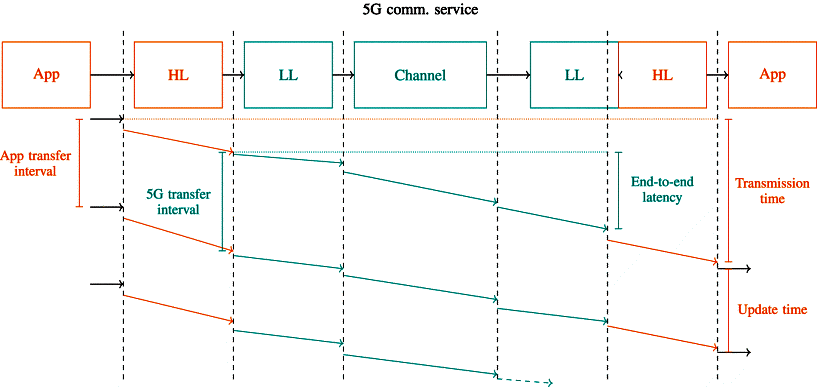A Perspective on Time Toward Wireless 6G

With the advent
of 5G technology, the notion of latency got a prominent role in
wireless connectivity, serving as a proxy term for addressing the
requirements for real-time communication. As wireless systems evolve
toward 6G, the ambition to immerse the digital into physical reality
will increase. Besides making the real-time requirements more
stringent, this immersion will bring the notions of time,
simultaneity, presence, and causality to a new level of complexity.
A growing body of research points out that latency is insufficient
to parameterize all real-time requirements. Notably, one such
requirement that received significant attention is information
freshness, defined through the Age of Information (AoI) and its
derivatives. In general, the metrics derived from a conventional
black-box approach to communication network design are not
representative of new distributed paradigms, such as sensing,
learning, or distributed consensus. The objective of this article is
to investigate the general notion of timing in wireless
communication systems and networks, and its relation to effective
information generation, processing, transmission, and reconstruction
at the senders and receivers. We establish a general statistical
framework of timing requirements in wireless communication systems,
which subsumes both latency and AoI. The framework is made by
associating a timing component with the two basic statistical
operations: decision and estimation. We first use the framework to
present a representative sample of the existing works that deal with
timing in wireless communication. Next, it is shown how the
framework can be used with different communication models of
increasing complexity, starting from the basic Shannon one-way
communication model and arriving at communication models for
consensus, distributed learning, and inference. Overall,
this article fills an important gap in the literature by
providing a systematic treatment of various timing measures in
wireless communication and sets the basis for design and
optimization for the next-generation real-time systems.
A Perspective on Time Toward Wireless 6G | IEEE Journals & Magazine
| IEEE Xplore
About TACS
TACS Science
Technology Engineering and Consulting Delivers The Insight and Vision on Information
Communication and Energy Technologies for Strategic Decisions.
TACS is Pioneer and Innovator of many Communication Signal
Processors, Optical Modems, Optimum or Robust Multi-User or
Single-User MIMO Packet Radio Modems, 1G Modems, 2G Modems, 3G
Modems, 4G Modems, 5G Modems, 6G Modems, Satellite Modems, PSTN
Modems, Cable Modems, PLC Modems, IoT Modems and more..
TACS scientists engineers and consultants conducted fundamental scientific research in
the field of communications and are the pioneer and first
inventors of PLC MODEMS, Optimum or Robust Multi-User or
Single-User MIMO fixed or mobile packet radio structures in the
world.
TACS is a leading concept technology provider and top
science technology engineering and consultancy in the field of Information,
Communication and Energy Technologies (ICET). The heart of our
Consulting spectrum comprises strategic, organizational, and
technology-intensive tasks that arise from the use of new
information and telecommunications technologies. TACS Science
Technology Engineering and Consulting
offers Strategic Planning, Information, Communications and
Energy Technology Standards and Architecture Assessment, Systems
Engineering, Planning, and Resource Optimization.
|
TACS Science
Technology Engineering is a leading concept technology provider and
top science
technology engineering and consultancy firm in the field of information communication
and energy technologies (ICET).
The heart of our consulting spectrum comprises strategic,
organizational, and technology-intensive tasks that arise from the use of new
information, communication and energy technologies.
The major emphasis in our work is found in innovative consulting and
implementation solutions which result from the use of modern information,
communication and energy technologies.
TACS Science
Technology Engineering and Consulting
- Delivers the insight and vision
on technology for strategic decisions
- Drives
innovations forward as part of our service offerings to customers
worldwide
- Conceives
integral solutions on the basis of our integrated business and technological
competence in the ICET sector
- Assesses technologies and standards and develops
architectures for fixed or mobile, wired or wireless communications systems
and networks
- Provides
the energy and experience of world-wide leading innovators and experts in their fields for local,
national or large-scale international projects.
|






|